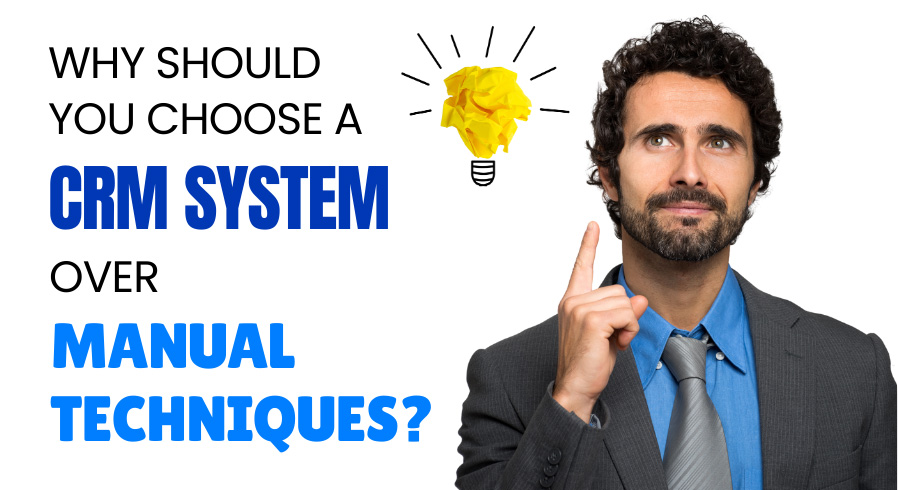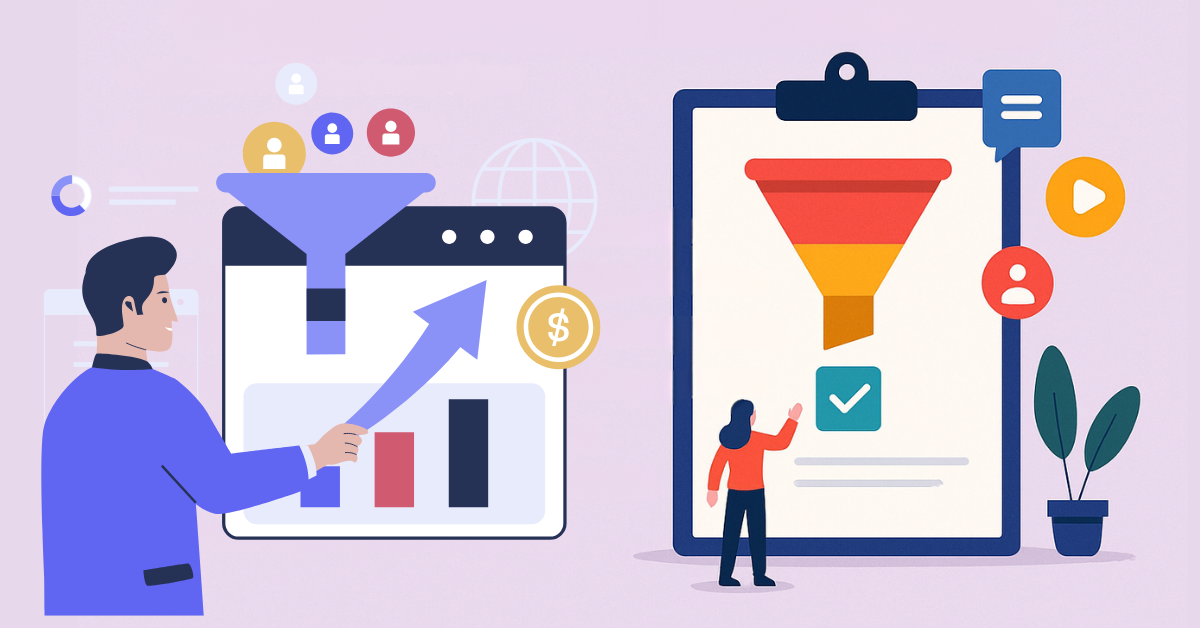Table of Contents
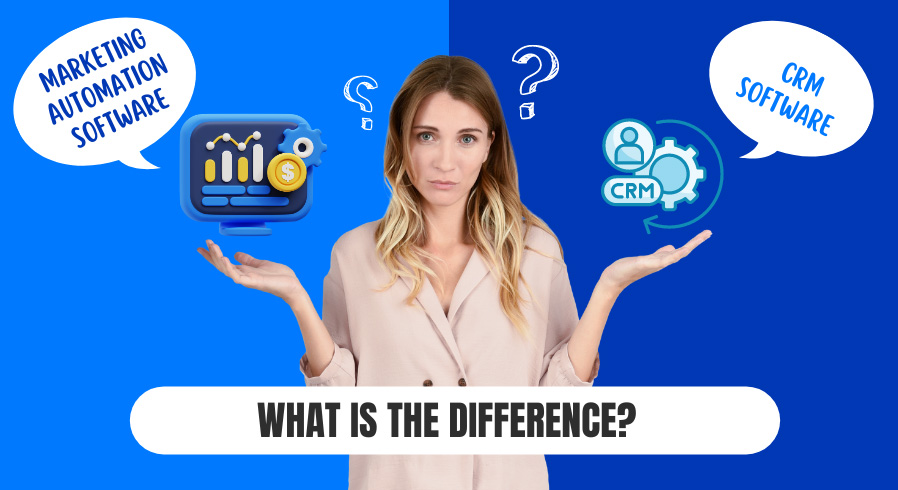
Have you ever wondered about the differences between a CRM (customer relationship management) tool and a marketing automation software system? If the answer is no, then you need to be familiar with the same to know the importance of both of the tools or software systems for the growth of your educational institution.
However, these two tools seem to be similar at a first glance. In reality, CRM and marketing automation software caters to a different set of requirements when it comes to expanding the reach of a business.
That is why it is especially crucial for the marketing professionals of a business to comprehend the differences between these two software systems. As a result, it would be easier for the marketing team to choose the most appropriate solution to take the productivity and performance of the business to the next level in the respective industry.
Otherwise, the wrong choice may harm the business growth by affecting the marketing funnel. Do not worry, if you are not certain about which system would serve your business the best. The post is going to give you clear insights into the differences between CRM and marketing automation software to help you make an informed business decision.
CRM & Marketing Automation Software: What Are the Basic Differences?
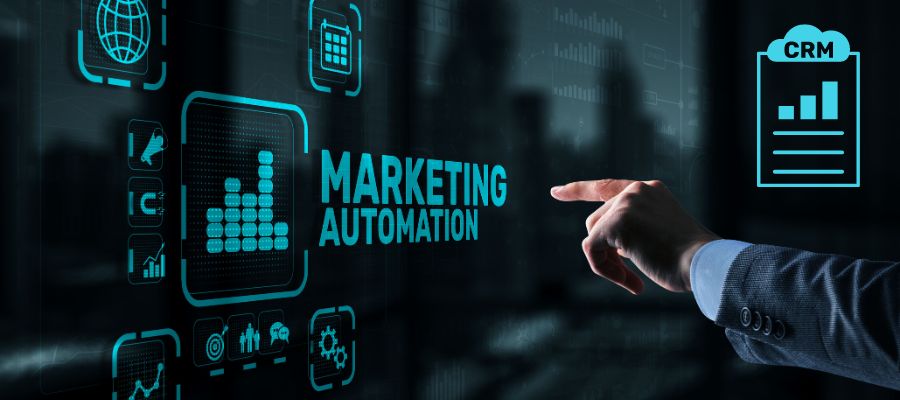
The key difference between a CRM tool and marketing automation software lies in their purposes or roles in a business. In essence, marketing automation software mainly concentrates on the marketing segment of a business whereas a CRM tool emphasizes the sales segment.
In short, a marketing automation software system enables a business to keep track of its marketing tasks as well as workflows. Moreover, such a tool leaves no stone unturned to facilitate and automate all the tasks related to marketing and promoting a business.
On the other hand, a CRM tool helps to monitor and manage the interactions and communications between the business and existing and potential clients. That means a CRM software system helps to attract more and more new clients for the business by strengthening the business-customer relationship.
When it comes to a buyer journey in a business, marketing automation software attracts new leads, finds out the viable leads, nurtures qualified leads, keeps track of active leads, and selects the marketing qualified leads.
On the other hand, a CRM software system finds out sales accepted leads and opportunities. In addition, it helps to close a deal and converts a potential client into a paid customer for a business. Hence, now, it is clear that a business calls for both marketing automation software and a CRM tool to take the growth and performance curve upward.
Although different businesses come with different marketing automation and CRM software funnels, the breakdown of the funnel would help you to comprehend the roles of marketing automation software and CRM for your business.
More Differences between Marketing Automation Software & CRM
Significance of Marketing Automation Software
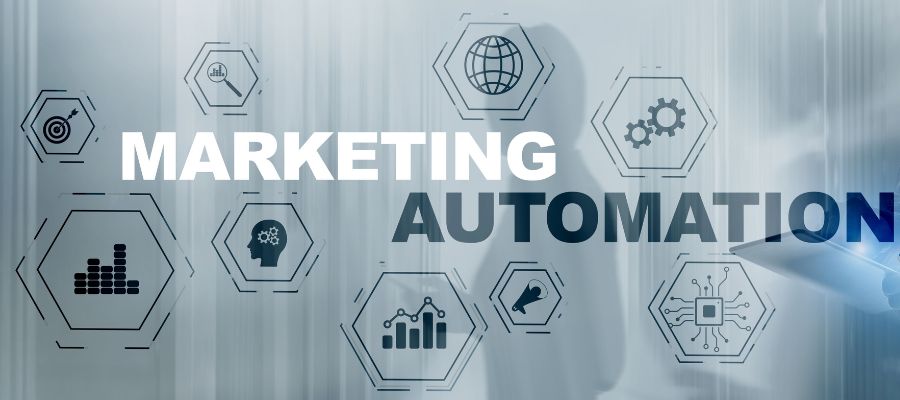
You already know that marketing automation software takes care of upper funnel activities of a prospect’s journey in the buying process. For instance, when an interested individual goes through a blog on a business website or opens a promotional or marketing email, it is monitored by marketing automation software.
In short, marketing professionals in business leverage the power of marketing automation software to schedule as well as monitor marketing campaigns. Whether it is about email campaigns or bulk business-to-customer interactions, marketing automation software takes care of all of these tasks with the ace.
Significance of a Customer Relationship Management Tool
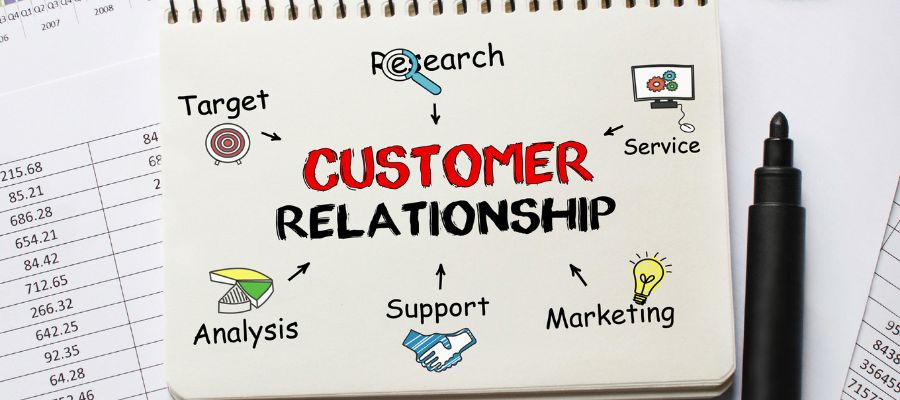
A CRM software system keeps track of the customer’s journey in a business, monitors all the records related to past purchases, keeps the records of interactions and communications with clients and prospects, and stores the information of inbound emails. A cutting-edge CRM tool leaves no stone unturned to ensure a boost in productivity and performance by providing many other advanced functionalities to its users.
For instance, EduCtrl is a top-notch education CRM software system that comes with a student panel, admin panel, and trainer panel to help a business grow in the educational ecosystem.
Is there anything else?
The marketing team of a business leverages the power of marketing automation software whereas the sales & customer support team makes use of a CRM tool. A CRM tool emphasizes one-on-one interactions and communications between the business and clients to take customer satisfaction and sales margin to the next level.
Did you know around 56% of small organizations have already started using CRM software to improve their business growth? Therefore, if you want to take the reputation, productivity, and performance of your educational institution to the next level, then opt for a best-in-class education CRM software (such as EduCtrl) today.
Marketing Automation Software & CRM: What are the differences in terms of their Roles?
Marketing Automation Software
Such a software system helps to build mailing lists to help marketers run marketing campaigns. In essence, marketing automation software focuses on the preferences and interests of prospects and keeps track of the interactions between the business and potential clients to come up with the most appropriate solution for them.
Moreover, marketing automation software plays a key role in nurturing qualified leads. The system enables marketing professionals to reach out to prospects when they show a great interest in the products or services of the respective business.
In other words, marketing automation software helps to send triggered emails to interested individuals automatically to convert prospects into paying customers.
In addition, a marketing automation tool helps marketers schedule email marketing campaigns to leave a positive impact on the prospects’ minds. A marketing automation system displays analytics to help marketing professionals monitor the performance and assess the success of marketing campaigns. You already know marketing automation software is essential when it comes to lead nurturing. However, it is also worth noting that these software systems make qualified leads ready to be handled by the sales team of the business to transform leads into customers. And it marks the start of the contributions of a CRM tool to a business.
In other words, marketing automation software and a CRM tool complement each other and that is why both of them are vital components in the buying journey of a customer.
Customer Relationship Management Tool:
You already know the starting point of a CRM software system in the buying journey of a potential client. Such a tool helps the sales team of a business to keep track of the customer’s position in the sales funnel. As a result, sales professionals can expect to close the deal with ease.
A CRM tool helps a business reach out to existing and potential clients with relevant promotional materials to strengthen the business-customer relationship as well as business reputation.
Furthermore, a CRM software system helps sales personnel resolve the queries of potential clients and ensures better interactions every time by recording and monitoring past conversations. It further helps the sales team to personalize the interactions between the business and prospective customers.
A customer relationship management tool sends internal alerts to sales personnel when it comes to renewing a client’s license or account or scheduling a call. Even a CRM tool notifies the sales team of a business about the upcoming birthday of customers. Thus, sales personnel can reach out to existing and prospective clients on different occasions, which in turn, would take the authenticity and credibility of the business to the next level.
Best-in-class CRM tools can integrate with various applications, such as social media platforms. As a result, the sales team can monitor the channels generating the most traffic and attracting the maximum number of leads. It also helps the sales team to know about the people’s opinions about the business to enable the professionals to create strategies to boost the business reputation in the industry.
In essence, a CRM tool helps to close deals by streamlining the sales process and ensuring a personalized experience for both current and prospective clients.
When does an organization need Marketing Automation Software?

Let us check out the signs when a business requires marketing automation software the most:
Whenever the list of leads gets too long to be handled manually, marketing automation software comes to the rescue for marketers. It is not easy to find out qualified leads and nurture those leads to send them ahead to the sales team. However, marketing automation software has streamlined this task for the marketing personnel of a business.
In other words, marketing automation software makes each lead travel through the correct steps of the marketing funnel of the business to make them ready to handle by the sales team.
If the customer list is not adequate to ensure business growth, then it is time to leverage the power of marketing automation software. As a result, marketing personnel can take their outreach experience to the next level.
If the marketing team of a business has something to share with the target customers, then marketing automation software can streamline the task. Thus, the content can be presented in front of the target audiences at the correct time with ease.
When does a business require a CRM tool?
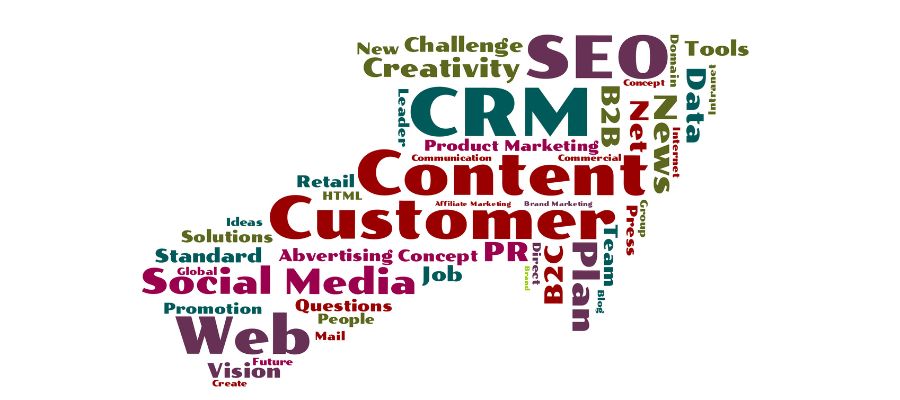
Whenever a business decides to step up its reputation in the industry, it is a must to leverage the power of a CRM tool. For instance, a CRM software system helps sales personnel to reach out to unhappy or unsatisfied customers to address their complaints before it affects the business’s reputation. In other words, a CRM tool helps to improve the customer support service of a business by keeping track of customer feedback and reports.
It is not a rare case when a department in a business loses track of a prospective client whenever they travel throughout different departments. Nonetheless, a CRM tool comes as a boon in this situation. A customer relationship management tool leaves no stone unturned in tracking existing and prospective customers and taking customer experience to the next level.
Whenever the current lead data tracking system of a business is unable to handle the current number of leads, it is high time to start using a CRM tool to monitor the client’s data.
What is the significance of a separate Marketing Automation Software and CRM Tool?
Does your business call for separate marketing automation software and a CRM system? The answer depends on the position of your prospective clients in the funnel.
However, if you do not want to go for two separate solutions, having a cutting-edge CRM tool (for instance, EduCtrl is an ideal education CRM solution for educational institutions) is enough to cater to the requirements of both the marketing and sales departments of a business.
In other words, today’s advanced CRM tools come with a comprehensive interface that can handle both marketing and sales functions with ease.
Marketing Automation Software & CRM Tool: Differences in brief
In short, marketing automation software takes care of digital marketing campaigns and email marketing campaigns. In addition, it keeps track of leads and calculates lead scoring. Needless to say, there are many responsibilities of cutting-edge marketing automation software in a business.
On the other hand, a customer relationship management solution takes care of the sales pipeline process. In addition, the system monitors individual emails, keeps track of the lead status, tracks opportunities, and so on.
Whereas a CRM tool helps to boost sales for a business, marketing automation software generates leads, finds out qualified leads, and nurtures leads to be further taken care of by the sales team.
It is time to check out the differences between marketing automation software and a CRM tool in terms of the goal, purpose, and target audience:
A marketing automation software system keeps track of the productivity and performance of marketing efforts (such as marketing campaigns) of a business. Thus, marketing personnel can evaluate qualified leads, calculate the total ROI, and take the workflows for marketing and sales departments to the next level.
The key goal of marketing automation software is to automate digital marketing campaigns of a business based on set conditions as well as triggers. When it comes to short purchase cycles, marketing automation tools come in handy. However, a CRM tool streamlines sales processes for the sales personnel of a business. Moreover, when it comes to assigning tasks to sales professionals or managing an organized database, a cutting-edge CRM tool comes as a rescuer.
A marketing automation software system caters to the requirements of the marketing personnel of a business. On the other hand, sales reps of a business need to leverage the power of a CRM tool to close deals and generate revenue.
Note that both marketing automation software and CRM tools strive to save a lot of time and effort for marketing and sales personnel by automating redundant tasks of a business. As a result, marketing and sales teams can devote their time to scaling as well as optimizing processes to take their productivity to the next level. It gives team members enough time and scope to think about building new products or introducing new features to the existing products.
In essence, your business is in dire need of a marketing automation software program and a customer relationship management tool. Alternatively, you can also go for an integrated platform to get the best of both worlds.
Wrapping Up
I hope you are now clear with the concepts of marketing automation software and CRM tools. And you are also familiar with the fact that both systems are completely different yet they complement each other. Whether you are looking for two separate solutions or one integrated system for both, it is a vital need for every business where growth and development are two key objectives.



